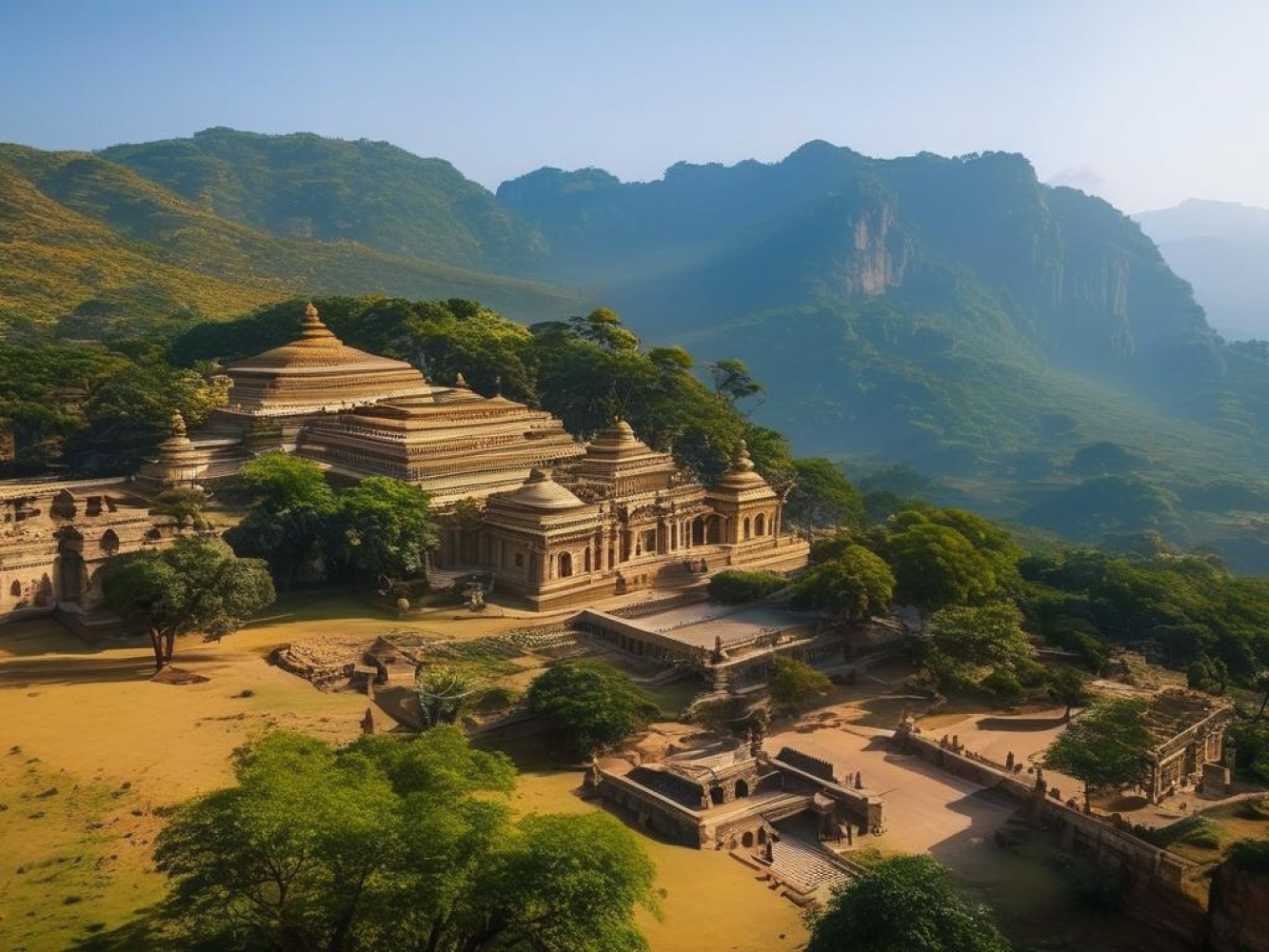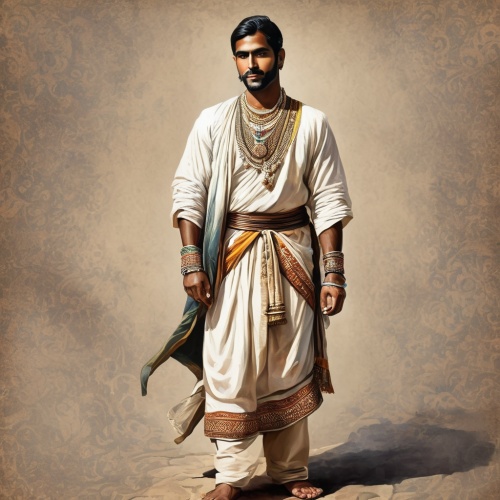Understand
Buddhism, a non-theistic religion, was founded around 400-500 BC by Sakyamuni Buddha. Born as Prince Siddhartha Gautama in Lumbini, which is now located in modern-day Nepal near the Indian border, he discovered that a life of luxury did not bring inner peace. Realizing that suffering affects both the rich and the poor, he renounced his title and wealth to find a path that could lead all beings to freedom from suffering. After years of exploration, meditation, and spiritual practices, the Buddha had a profound awakening at Bodh Gaya. His teachings, encompassed in the Four Noble Truths, were first shared with a group of ascetics at the Deer Park in Sarnath. The Buddha passed away in Kushinagar, believed to be over 80 years old at the time. For centuries, Buddhism thrived in India, receiving support from influential kings like Asoka the Great. However, it faced challenges and gradually declined in the lowlands after the burning of the Nalanda Buddhist center by Turkic Islamic raiders in 1193. Despite this setback, Buddhism continued to flourish in the Himalayan regions. Buddhism can be divided into two main schools: Theravada, which focuses on personal liberation from suffering and spread to countries like Thailand and Sri Lanka, and Mahayana, which emphasizes the liberation of all beings and is prevalent in countries such as China, Japan, Korea, Bhutan, and Taiwan. Tibetan Buddhism, known as Vajrayana, is an offshoot of Mahayana that differs in practice but shares the same philosophy. All Buddhist schools prioritize wisdom, compassion, and reject the idea of religious conversion. Additionally, karma, the law of cause and effect, is recognized by all Buddhists as the force behind our illusory universe, known as samsara.
Understand
Hinduism, one of the oldest religions in the world, is widely practiced in the subcontinent. It revolves around the concept of dharma, or truth, which guides the beliefs and actions of its followers. According to Hindu philosophy, all living beings have a soul that is reborn multiple times, in both human and animal forms. The actions of an individual, known as karma, determine their destiny in the next life. Hinduism may appear to have numerous gods, but they are all considered different manifestations of the supreme spirit, Brahma the Creator. Vishnu the Preserver and Shiva the Destroyer are two of the most important deities. These gods are revered in elaborately decorated temples, where priests carry out prayers and rituals. The Ganges river holds immense holiness for Hindus, who believe that bathing in its waters purifies and absolves their sins. Millions of pilgrims visit the Varanasi ghats and Haridwar to take a holy dip in the sacred Ganges. While the majority of Hindus reside in India, Nepal, and Sri Lanka, there are small Hindu communities in North America, Europe, and the Middle East. Nepal stands as the only Hindu state in the world, coexisting with a significant Buddhist population.
Understand
Islam, founded by the Prophet Mohammed in the 6th century, means surrendering to the will of God. Muslims believe that the angel Gabriel appeared to the Prophet in a cave near Mecca, instructing him to spread the message of one God, Allah. Initially met with resistance from the ruling powers, Mohammed and his followers sought refuge in Medina, a journey known as the Hijra, which marks the beginning of the Islamic calendar. Islamic teachings are compiled in the holy book called the Qur'an, which Muslims regard as a guide for life. Islam encompasses five pillars, representing the essential practices and beliefs of the faith. These include professing faith in one God and Mohammed as his messenger, praying five times a day, giving alms to the poor, fasting from dawn till dusk during Ramadan, and making a pilgrimage to Mecca, known as the Hajj, at least once in a lifetime. Muslims gather in mosques for prayer, led by an Imam, and unite each Friday for communal prayers and to listen to sermons. India is home to a significant Muslim population, with over 150 million followers. There are several important Islamic sites in the country, including those in Kerala, which hold great reverence for believers. Islam has a wide global presence, with communities in Canada, the United Kingdom, the Middle East, Southeast Asia, and various other regions.
Understand
Sikhism originated in Northern India's Punjab region during the 16th century. Its teachings were introduced by Guru Nanak and continued by nine successive Gurus. Sikh philosophy, known as Gurmat, heavily relies on the teachings of these Gurus. Guru Nanak himself was born into a Hindu family but emphasized unity among different religions, believing that people's beliefs and actions mattered more than ceremonies and rituals. The holy book of Sikhism is called the Guru Granth Sahib, which contains the sacred teachings of the Gurus. Sikh places of worship, known as Gurudwaras, serve as the gateway to the Guru. Unlike other religions, Sikhism does not have priests. Instead, readers known as Granthi lead services and recite passages from the Guru Granth Sahib. Members of the congregation are also encouraged to participate during services. The majority of Sikhs reside in Punjab, forming a significant portion of the state's population. However, Sikh communities can be found throughout India and in various countries worldwide. These include Canada, the United Kingdom, the Middle East, Southeast Asia, Australia, and New Zealand, among others.
Map & Climate
Popular Foods
 Dish: Butter Chicken (Murgh Makhani)Butter chicken is a rich and creamy curry made with marinated chicken pieces cooked in a tomato-based sauce. The dish originated in the Indian subcontinent and gained popularity in Canada due to the large population of Indian immigrants. It's typically served with basmati rice and naan bread. Butter chicken contains meat – chicken.
Dish: Butter Chicken (Murgh Makhani)Butter chicken is a rich and creamy curry made with marinated chicken pieces cooked in a tomato-based sauce. The dish originated in the Indian subcontinent and gained popularity in Canada due to the large population of Indian immigrants. It's typically served with basmati rice and naan bread. Butter chicken contains meat – chicken.  Dish: BiryaniBiryani is a popular rice dish made by cooking Basmati rice with meat (usually chicken, goat, or fish), vegetables, yogurt, and a blend of spices. It originates from the Indian subcontinent and is often considered the national dish of Pakistan. It's known for its flavorful layers and distinct aroma. Biryani contains meat – primarily chicken, goat, or fish.
Dish: BiryaniBiryani is a popular rice dish made by cooking Basmati rice with meat (usually chicken, goat, or fish), vegetables, yogurt, and a blend of spices. It originates from the Indian subcontinent and is often considered the national dish of Pakistan. It's known for its flavorful layers and distinct aroma. Biryani contains meat – primarily chicken, goat, or fish.  Dish: SamosasSamosas are deep-fried or baked pastry snacks filled with a savory mixture of spiced potatoes, onions, peas, and sometimes meat. They originate from South Asia and have become a popular street food across India. Often served as an appetizer or a quick snack, samosas can be found at roadside stalls, train stations, and even weddings. Samosas can contain meat – typically potatoes, onions, and peas, but some varieties may include meat such as chicken or lamb.
Dish: SamosasSamosas are deep-fried or baked pastry snacks filled with a savory mixture of spiced potatoes, onions, peas, and sometimes meat. They originate from South Asia and have become a popular street food across India. Often served as an appetizer or a quick snack, samosas can be found at roadside stalls, train stations, and even weddings. Samosas can contain meat – typically potatoes, onions, and peas, but some varieties may include meat such as chicken or lamb. 




Comments
NO COMMENTS